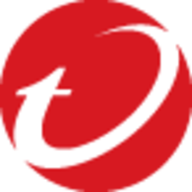


Trend Micro and Prisma Cloud offer competitive pricing, flexible licensing options, and strong ROI. However, Trend Micro is praised for its anti-malware protection, virtual patching, and intrusion detection, while Prisma Cloud is commended for its visibility across multi-cloud environments, advanced threat detection, and compliance automation. Trend Micro users appreciate its UI but note issues with performance impact and customer support, while Prisma Cloud users highlight the need for better UI, integration, documentation, and training resources.
The summary above is based on 177 interviews we conducted recently with Trend Micro Deep Security and Prisma Cloud by Palo Alto Networks users. To access the review's full transcripts, download our report.
The detailed information PingSafe gives about how to fix vulnerabilities reduces the time spent on remediation by about 70 to 80 percent.
After implementing SentinelOne, it takes about five to seven minutes.
Our ability to get in and review our vulnerability stance, whether daily, monthly, weekly, or whatever it might be, has drastically improved over our prior provider.
It eliminates the need for additional hardware, making it a financially and technically sound investment.
Reputation and data security are the two most important things to a financial institution.
We may have prevented a security breach with remediation of the findings.
The management console is very useful and easy to operate, allowing policy deployment in a minimal amount of time.
It adds value by providing centralized control over servers and endpoints.
If the customer is interested in technical capabilities, we demonstrate the tools, setup, implementation, and their working.
When we send an email, they respond quickly and proactively provide solutions.
They took direct responsibility for the system and could solve queries quickly.
Having a reliable team ready and willing to assist with any issues is essential.
They can respond with technical documentation or pass on the case to the next level because it requires the development of a new feature or changing a feature due to a bug.
Anywhere we raise a tech case, they revert back within an hour.
Support is not just good; it's excellent.
Whenever I raise a ticket, whether critical or high priority, their team responds immediately, often over calls, and works towards closing the request with the highest priority.
They have very professional engineers, and they often respond effectively.
A dedicated support engineer will come in within three hours.
I would rate it a 10 out of 10 for scalability.
Scalability is no longer a concern because Cloud Native Security is a fully cloud-based resource.
I would rate the scalability of PingSafe 10 out of 10.
Scalability is a strong aspect; we have never experienced issues with it.
Scalability-wise, I rate the solution a nine out of ten.
We haven't had any issues scaling the solution.
Trend Micro Deep Security is highly scalable.
In most organizations, they are using a mix of these security solutions.
You can install it on a script basis for Linux and Windows.
SentinelOne Singularity Cloud is incredibly reliable.
We contacted Cloud Native Security, and they addressed it in a day.
The only downtime we had was when switching from V1 to V2 but it was smooth.
I would rate it a ten out of ten for stability.
It provides excellent stability capabilities.
Most of the time, when the client requires data, it is not available.
It has been extremely stable throughout our usage, with no major disturbances.
Trend Micro Deep Security is very stable and provides protection at all times without issues.
We believe that software works fine until it is patched, managed, or monitored by the IT teams.
If they can merge Kubernetes Security with other modules related to Kubernetes, that would help us to get more modules in the current subscription.
As organizations move to the cloud, a cloud posture management tool that offers complete cloud visibility becomes crucial for maintaining compliance.
I would also like to see Cloud Native Security offer APIs that allow us to directly build dashboards within the platform.
Prisma Cloud is an excellent tool.
We could have deployed the runtime monitoring with Prisma Cloud by Palo Alto Networks, but within our organization at our company, it was very difficult to find who would be the owner for the alerts.
Even though documentation was available, it took a while for a new person to understand what integration meant, what will be achieved after the integration, or how the integration needed to be done on the Azure or AWS side.
User experience improvement is most crucial, along with enhancements in policy management and the accuracy of the IPS, IDS features for real-time protection.
Additionally, the product is overpriced, which makes it difficult to sell to many customers.
The user interface could be more user-friendly, as navigation sometimes requires familiarity with the console.
With very little negotiation involved, we just let them know what we could pay and they were willing to meet us at slightly above what we paid with Sophos, which was still very fair for what we were looking at.
There are some tools that are double the cost of Cloud Native Security.
I recall Cloud Native Security charging a slightly higher premium previously.
The cost was not on the higher side.
If you are using a single tool like Prisma Cloud, with a single license, you can monitor all environments, such as Google Cloud, Azure, AWS, and Oracle Cloud.
Prisma Cloud isn't cheap.
We give a fair comparison of all the products, and give them clear insights of the products, which makes it helpful for the customer to make a final decision to purchase the license or product.
Trend Micro Deep Security is considered overpriced, which poses a challenge in selling it to many customers.
The pricing is moderate, not expensive or very cheap.
This helps visualize potential attack paths and even suggests attack paths a malicious actor might take.
The infrastructure-as-code feature is helpful for discovering open ports in some of the modules.
This tool has been helpful for us. It allows us to search for vulnerabilities and provides evidence directly on the screen.
Prisma Cloud excels by offering a comprehensive solution within a single dashboard. This unified approach addresses all our requirements, making it the most advantageous aspect of this tool.
There is a wide range of integrations, and the compatibility with various cloud providers is very useful.
It provides a single pane of glass.
It has multiple security layers, including anti-malware, intrusion prevention, integrity monitoring, web reputation, application control, firewall, and log inspection.
Patching allows us to virtually patch servers without downtime, which is critical given our limited patching windows, and helps prevent servers from being exploited.
The IPS module offers virtual patches to resolve issues immediately, making it an excellent product that I recommend for anyone with servers.
| Product | Market Share (%) |
|---|---|
| Prisma Cloud by Palo Alto Networks | 12.8% |
| Wiz | 20.2% |
| Microsoft Defender for Cloud | 9.8% |
| Other | 57.2% |
| Product | Market Share (%) |
|---|---|
| Trend Micro Deep Security | 38.4% |
| Sophos Virtualization Security | 19.8% |
| Juniper vSRX | 18.1% |
| Other | 23.69999999999999% |

| Company Size | Count |
|---|---|
| Small Business | 47 |
| Midsize Enterprise | 20 |
| Large Enterprise | 53 |
| Company Size | Count |
|---|---|
| Small Business | 36 |
| Midsize Enterprise | 22 |
| Large Enterprise | 56 |
| Company Size | Count |
|---|---|
| Small Business | 36 |
| Midsize Enterprise | 24 |
| Large Enterprise | 46 |
SentinelOne Singularity Cloud Security offers a streamlined approach to cloud security with intuitive operation and strong integration capabilities for heightened threat detection and remediation efficiency.
Singularity Cloud Security stands out for its real-time detection and response, effectively minimizing detection and remediation timelines. Its automated remediation integrates smoothly with third-party tools enhancing operational efficiency. The comprehensive console ensures visibility and support for forensic investigations. Seamless platform integration and robust support for innovation are notable advantages. Areas for development include improved search functionality, affordability, better firewall capabilities for remote users, stable agents, comprehensive reporting, and efficient third-party integrations. Clarity in the interface, responsive support, and real-time alerting need enhancement, with a call for more automation and customization. Better scalability and cost-effective integration without compromising capabilities are desired.
What are SentinelOne Singularity Cloud Security's standout features?SentinelOne Singularity Cloud Security is deployed in industries needing robust cloud security posture management, endpoint protection, and threat hunting. Utilized frequently across AWS and Azure, it assists in monitoring, threat detection, and maintaining compliance in diverse environments while providing real-time alerts and recommendations for proactive threat management.
Prisma Cloud by Palo Alto Networks provides comprehensive cloud-native security solutions. It covers dynamic workload identity, automated forensics, and multi-cloud protection, ensuring robust security across diverse cloud platforms.
Prisma Cloud delivers advanced capabilities for managing cloud security across AWS, Azure, and GCP platforms. It offers dynamic workload identity creation, real-time monitoring, and seamless integration into CI/CD pipelines. With automation, centralized dashboards, and enhanced visibility, users effectively manage security misconfigurations and vulnerabilities. While optimizing cloud environments through runtime protection and compliance, Prisma Cloud faces challenges with its navigation, pricing, and limited automation capabilities. Users seek improvements in API security, role-based access controls, and documentation quality, emphasizing the need for enhanced customization and reporting features.
What are the important features of Prisma Cloud?
What benefits or ROI should users consider in reviews?
Industries like finance and telecom rely on Prisma Cloud for managing cloud security posture and container security. Teams utilize its capabilities across hybrid and multi-cloud settings to ensure compliance and robust threat protection. Features like misconfiguration detection and runtime monitoring are critical in promoting security objectives in these sectors.
Trend Micro Deep Security is a comprehensive solution for endpoint security and server protection, which prevents ransomware attacks and unauthorized access attempts. Its valuable features include tracing back attacks, antivirus protection, endpoint detection and response, firewall-based solution, threat detection, predictive machine learning and AI monitoring, VPM, virtualization, and sandboxing.
The solution is easy to use, scalable, stable, and reliable, with good technical support. It has helped organizations perform well against malware and vulnerabilities, provide patching from the Protection Cloud, and improve their security posture.
Trend Micro Deep Security Features
Trend Micro Deep Security has many valuable key features. Some of the most useful ones include:
Reviews from Real Users
Trend Micro Deep Security stands out among its competitors for a number of reasons. Two major ones are its robust data and loss prevention feature and its patch management, which saves users money. PeerSpot users take note of the advantages of these features in their reviews:
One PeerSpot reviewer, a Senior Security Advisor at a healthcare company, writes, “DLP, Data Loss Prevention, and the complexity of how we manage the console and how this client, or this tool, will notify us when there is something going wrong within the server and endpoint, is good.”
Nadeem S., CEO at Haniya Technologies, notes of the solution, “Patch management is most valuable. The major selling point of Deep Security is that it is based on the cloud. Deep Security is for the servers and databases of data centers, and generally, for patch management, you have to shut down the machines, and then you have to restart them. So, they need shutdown time, which is a cost.”
We monitor all Cloud-Native Application Protection Platforms (CNAPP) reviews to prevent fraudulent reviews and keep review quality high. We do not post reviews by company employees or direct competitors. We validate each review for authenticity via cross-reference with LinkedIn, and personal follow-up with the reviewer when necessary.